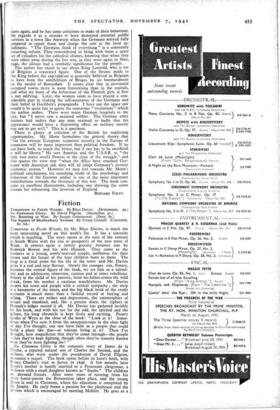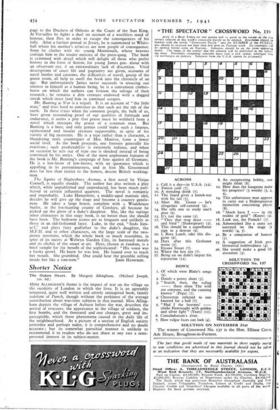Fiction
8s. 6d.) Tomorrow to Fresh Woods, by Mr. Rhys Davies, is much the most interesting novel on this week's list. It has a sincerity which is touching. The story opens at the turn of the century in South Wales with the rise to prosperity of the new town of Wern. It centres upon a family grocery business run by Roderick Bowen and his wife Hannah. They come to the business as a young, newly-married couple, ambitious for their future and the future of the four children born to them. The shop is a focal point for the life of the town and Mr. Davies gives it a real and racy flavour. Slowly the youngest son, Penery, becomes the central figure of the book, we see him as a school- boy and as adolescent, observant, curious and at times rebellious. Penery is the child of his parents; from his father comes the wild streak, from his mother a cautious watchfulness. Mr. Davies creates his town and people with a critical sympathy ; the shop is a barometer of the times, and the big black book of the credit accounts is .much more than a faithful record of buying and selling. There are strikes and depressions, the catastrophies of nature and mankind, and, like a precise diary, the ciphers in Hannah's ledger record it all. Mr. Davies has gathered lavishly for his book, and with his eye for the odd, the spirited and the gallant, his long chronicle is kept lively and exciting. Penery speaks of Wem at the dose of the book : " Look at it! Some- times when I've seen it from the mountain-tops in the clear light Of day I've thought, can one have faith in a people that could build a place like that—or tolerate living in it?. Then I've thought, how magnificent that they've come through—the people
• —that they've kept fighting, though often they've scarcely known what they've been fighting for! "
No Common Glory is the romantic story of James de la Cloche, a reputed natural son of Charles the Second, and the authors, who write under the pseudonym of David Pilgrim, announce a sequel. The book opens before its hero's birth, with Prince Charles's visit to Jersey in 1646. A few months later James's mother is hastily married to a Protestant clergyman, a widower with a small daughter known as " Snubs." The children are devoted friends. After some years of tutoring from his strict foster-parent the Restoration takes place, and the young James is sent to Clermont, where his education is completed by the Jesuits. He early forms a passion for the playhouse and the Pl=yers which is encouraged by meeting Moliere. He goes as a page to the Duchess of Orleans at the Court of the Sun King. At Versailles he fights a duel on account of a worthless maid of honour, then flies in order to escape the consequences- of his folly. After a further period in Jersey, he is summoned to White- hall where his mother's relatives are now people of consequence. Soon he clashes with the young Monmouth, whose bravoes consign him to the tender mercies of the press-gang. The book is crammed with detail which will delight all those who prefer history in the form of fiction, for young James goes about with an observant eye, if an extraordinary lack of discretion. Vivid descriptions of court life and pageantry are given, accounts of naval battles and customs, the difficulties of travel, gossip of the green room, all help to swell the book into the chronicle of an age. But unfortunately James never succeeds in arousing our interest in himself as a human being, he is a convenient clothes- horse on which the authors can festoon the salvage of their research ; he remains a dim creature endowed with a dogged streak which must land him in continual scrapes.
Mr. Bunting at War is a sequel. It is an account of " the little man," and tries hard to convince us that such are the salt of the earth. In these times when the common people, the bulk of us, have given resounding proof of our qualities of fortitude and endurance, it seems a pity that praise must be withheld from a novel which attempts the praise of a common man. But Bunting is a bore, and only genius could make such a fatuous, opinionated and insular creature supportable, in spite of his variety of big moments. He is a type rather than a character, a blundering male counterpart of Mrs. Miniver, from a lower social level. As the book proceeds, one foresees generally his reactions ; such predictability is extremely tedious, and when on occasion he acts out of type one is shocked instead of being convinced by his antics. One of the most unpleasant features of the book is Mr. Bunting's campaign of hate against all Germans. He is a low-brow of low-brows, with an ignorance which is appalling in its pretentiousness, and in him Mr. Greenwood does far less than justice to the honest, decent British working- man.
The Squire of Shaftesbury Avenue, a first novel by Vivian Connell, is equally shoddy. The author has also written a play which, while unpublished and unproduced, has been much pub- licised in certain influential quarters. The novel is romantic and improbable. Luke Hampshire, a middle-aged matinee idol, decides he will give up the stage and become a country gentle- man. He takes a large house, complete with a Wodehouse butler, in the fox-hunting county of Cotshire, all because he picked up the glove of a duke's daughter. She, like the various other characters in this stagy book, is no better than she should have been. The bedroom scenes are as frequent and unlikely as those in an old-fashioned farce. Luke, in the end, " findS him- self," and plays fairy godfather to the duke's daughter, the M.F.H. and to other characters, on the large scale of the two- penny novelette, which the whole book so much resembles, in spite of its sneers at Welwyn Garden City, its barnyard morals and its clichés of the smart at art. Here, chosen at random, is a brief sample for the benefit of the sophisticated : " His voice was a husky growl. He knew he was lost. He leaned over to reach her mouth. She grumbled. One could hear the grumble rolling























 Previous page
Previous page